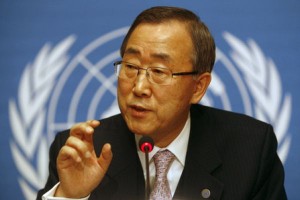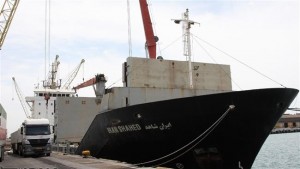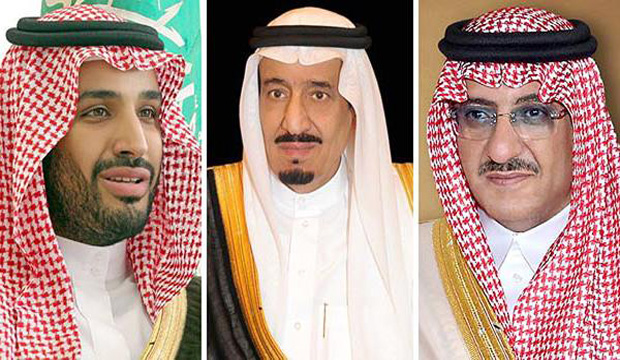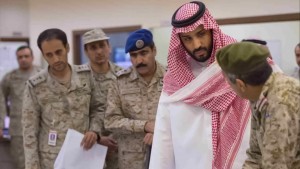Editor’s Note – Regardless how the White House spun the story of being snubbed by Saudi Arabia’s King Salman and three other leaders of Gulf States at the Camp David summit, it was obvious to clear thinking people that it was just that; a snub. The article below explains why it is actually even worse.
The Obama/Kerry policies in the region, especially regarding Iran, are an abysmal failure, just like their Israel/Palestinian stance. With the ‘deadline’ looming for a pact on Iran’s nuclear program, and open hostilities between Saudi Arabia and Iran’s Houthi proxies in Yemen, there is no positive spin that the White House can conjure up like they tried to do when Ramadi fell to IS in Iraq.
In fact, it is so bad that now the U.N. is sticking its nose into the fray in Yemen as well:

U.N. Secretary-General Ban Ki-moon – (AP Photo/Anja Niedringhaus)
U.N. chief Ban Ki-moon on Wednesday announced talks between warring Yemeni parties in Geneva on May 28 to end over seven weeks of war, as Iran agreed for international inspections of an aid ship sailing to Yemen.
The moves are aimed at defusing the deepening crisis in the southern Arabian Peninsula, where Saudi-led forces killed at least 15 Houthis in the latest air strikes in a campaign to restore President Abd-Rabbu Mansour Hadi. (Read more at Yahoo/Reuters.)
Further compounding the problems for Obama in the region are the continual harsh language coming from Ayatollah Khamanei in Tehran regarding the nuclear talks.
Iran’s supreme leader on Wednesday ruled out inspections of Iranian military sites and interviews of Iranian nuclear scientists in any potential deal on its nuclear program.
In a speech at a graduation ceremony at the Imam Hussein Military University in Tehran, the supreme leader, Ayatollah Ali Khamenei, denounced what he said were escalating demands in the nuclear talks between Iran and world powers that resumed on Wednesday in Vienna.
“They say new things in the negotiations. Regarding inspections, we have said that we will not let foreigners inspect any military center,” Ayatollah Khamenei said, according to a text of the speech released on his personal website, Khamenei.ir. (Read more here at the NY Times.)
Obama seems to have the “anti-Midas touch,” everything he and his administration touches turns to something akin to the complete opposite of gold and rhymes with “ship.”
Speaking of ships, there was a positive note coming from the region regarding the inspection of the Iranian vessel steaming to the area with humanitarian relief:

From PressTV, an Iranian Publication that takes its orders from Tehran – Dubbed Rescue, Iran’s ship is set to carry a group of humanitarian aid workers, medical technicians, and peace activists from the US, France, Germany, and Iran, along with a shipment of humanitarian aid, from the southern Iranian port city of Bandar Abbas in Hormozgan province to Yemen. (IRNA photo)
The U.N. announcement came as Iran announced that the Iranian cargo ship sailing to Yemen with 2,500 tonnes of food and medical supplies would submit to international inspections in Djibouti before continuing on to Yemen’s Hodaida port, which is under Houthi control.
The move reduces the risk of a potential showdown between the vessel, which had been escorted by Iranian warships, and Saudi-led forces enforcing inspections on vessels entering Yemeni ports to prevent arms supplies from reaching the Houthis.
“We have decided to dock our ship in Djibouti so the United Nations inspection protocol can take place,” Iran’s Deputy Foreign Minister Hossein Amir Abdollahian was quoted as saying by the ISNA news agency. (Read more at Yahoo/Reuters.)
But is that really a positive? Is what Iran calls the ship Iran Shaheb, dubbed the “Rescue,” really as advertised by Iran?
The Iranians still get to bring relief, but it is more likely than not, that only the Houthis will benefit once the U.N. allows them to go to Yemen. Add another one to the Obama loss column; the Iranians are getting their way despite recent efforts to thwart them.
Rejuvenated Royals – The Saudis push back against the Obama foreign policy.
By HUSSAIN ABDUL-HUSSAIN for the Weekly Standard
The Obama administration put a happy face on its Camp David summit last week, even as four of the Gulf Cooperation Council’s six leaders turned down Obama’s invitation to attend. The most significant absence, of course, was that of Saudi Arabia’s king, Salman. In his place, Riyadh sent Salman’s 55-year-old nephew, Crown Prince Mohammed bin Nayef, and Salman’s 28-year-old son, Mohammed bin Salman, deputy crown prince and defense minister.

Composite image showing King Salman Bin Abdulaziz (C), Crown Prince Mohammed Bin Naif (R) and Deputy Crown Prince Mohammed Bin Salman. (Asharq Al-Awsat)
Both men are said to be responsible for the aggressive Saudi policies in confronting Iran, especially in Yemen, where Mohammed bin Salman is leading the campaign against the Iranian-backed Houthis. In other words, while snubbing Obama, King Salman also delivered a strong message through the two men who are in line to lead Saudi Arabia for the foreseeable future. They’re not happy with what they correctly perceive as the White House’s pro-Iranian tilt in the Middle East—and they’re in a position to challenge it.
In Crown Prince Mohammed bin Nayef, referred to in Western policymaking circles as MBN, the White House is likely to find an especially able statesman. MBN served as the deputy minister of the interior under his father and then won the top post himself, where he has distinguished himself as a tough-minded security official who proved instrumental in dismantling terrorist networks and providing U.S. officials with valuable insight into their workings. He has survived at least four assassination attempts.
But it is MBN’s studious navigation of court politics that landed him in the number two spot. Indeed, it’s something of a paradox that a man so skillful in handling intra-Saudi rivalries is now behind a foreign policy that, in contrast to Riyadh’s all-too-frequent navel-gazing, is remarkably activist. MBN owes his power to ambition, skill, and the fact that he has no sons to move into the line of succession, which has made him a useful ally in court maneuvering.
Saudi royal politics are typically inscrutable, since the Saudis do not make a habit of publicizing divisions within their ranks, and their disagreements are resolved in private. But here is the short version of what has happened in 2015: Since taking over earlier this year after the death of his predecessor, King Salman has engineered a new line of succession. The upshot is that we are witnessing something novel in Riyadh.
For the last several decades, the succession question has dominated Saudi politics—which is hardly a surprise when 70-something monarchs name 70-something crown princes, and illness and sudden death become central concerns in policymaking circles.
That instability often incapacitated Saudi decisionmakers and at times left an otherwise preoccupied Riyadh vulnerable to regional issues. But with a 55-year-old crown prince and a 28-year-old deputy crown prince, the royal palace seems set to enjoy a level of stability it hasn’t seen since the death of Ibn Saud, the regime’s founder, in 1953.

Saudi Arabian Defense Minister Mohammed Bin Salman attends a briefing Wang Bo/Xinhua/ZUMA Wire
This is perhaps one reason why Riyadh seems more determined than ever to roll back Iranian influence in the Middle East. For once, they’re able to focus on external threats rather than who will inhabit the palace. For Riyadh, this fresh blood and surge of confidence couldn’t come at a better time. They’re concerned that the White House is downgrading the 70-year-long alliance with Riyadh in favor of upgrading relations with the Islamic Republic of Iran.
The Saudis have given up on the Obama administration. In return for helping the White House combat Sunni terror, Riyadh assumed the White House would keep its word and push back against Iran. However, the Obama administration has done exactly the opposite. It has paved the way for Iran to acquire a nuclear weapon within the next 15 years and accommodated Iranian interests around the Middle East, from Iraq and Syria to Lebanon and Yemen.
But to hear the Obama administration tell it, Saudi Arabia’s biggest problem comes not from Iran but inside. It’s unemployment, lack of opportunities, and a faulty education system that ail the Gulf Arabs, Obama has said in several interviews. And that, says the White House and its various media surrogates, is why the Saudis create so many terrorists.
There’s no doubt that Saudi society is riven by a host of problems and that private charities from the Gulf Cooperation Council states have frequently filled the coffers of terrorist outfits. However, why the White House feels comfortable chastising an ally of more than 70 years while turning a blind eye to Iran is unclear. After all, every indicator, from suicide to drug use, birth rate to prostitution, shows that Iranian society is as bad as or much worse than the societies of the Gulf states. Moreover, unlike Saudi Arabia and the Gulf sheikhdoms, Iranian state institutions are actively exporting terrorism.
Perhaps Obama is worried that calling out the Iranians as he has called out the Saudis might push Tehran away from the negotiating table. What he’s done instead is endanger the relationship with one of the pillars of American Middle East policy and sent Riyadh out looking for new friends. It appears that the message Riyadh is sending through MBN is that they’re not going to take it anymore. Maybe they don’t have to.
Hussain Abdul-Hussain is the Washington bureau chief of the Kuwaiti newspaper Alrai.

